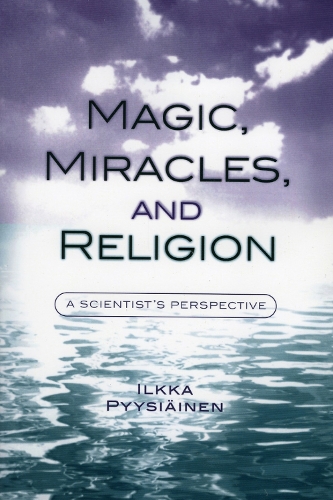
Magic, Miracles, and Religion: A Scientist's Perspective
(Paperback)
Publishing Details
Magic, Miracles, and Religion: A Scientist's Perspective
By (Author) Ilkka Pyysiinen
AltaMira Press
AltaMira Press
1st June 2004
United States
Classifications
General
Non Fiction
210
Physical Properties
Paperback
298
Width 165mm, Height 227mm, Spine 22mm
449g
Description
Can scientists study religion Ilkka PyysiSinen says that they can. While the study of religion cannot be reduced to other disciplines, it must not ignore what other disciplines have learned about human thought and behavior. In this collection of essays, PyysiSinen shows how findings from cognitive science can offer new directions to debates in religion. After providing a historical and theoretical overview of the cognitive science of religion, PyysiSinen demonstrates how knowledge of the mind's workings can help deconstruct such concepts as 'god,' 'ideology,' 'culture,' 'magic,' 'miracles,' and 'religion.' For scholars of religion or for scholars of the mind-brain, Magic, Miracles, and Religion provides a helpful overview to this emerging field.
Reviews
Ilkka Pyysiinen's scientific unweaving of magic, miracles, and religion illuminates these universal creations of the human imagination in ways that render them even more awesome to behold. -- Scott Atran, Centre National de la Recherche Scientifique Paris, France
Considering the inter-disciplinary nature of this text it is fair to say that it will prove useful to a variety of audiences. Scholars of phenomenology, folklore, the social sciences and humanities, as well as of Pyysiinen's area of speciality (cognitive science), would all benefit from a consideration of this text. * Studies in Religion/Sciences Religieuses *
In Magic, Miracles, and Religion Pyysiinen rejects as too subjective approaches to the study of religion directed to obtaining answers to personal religious questions or achieving an empathetic understanding of how it feels to be religious. He explains how an understanding of the cognitive origins of all human behavior can provide a much more sensible explanation of religion, and his analyses, arguments, and case studies provide persuasive accounts of religious thought, behavior, and experience. This is a genuinely new kind of introduction to the study of religion and it holds out promise for a renewal of the field of Religious Studies with an approach to it that has the capacity to integrate the natural sciences with the social sciences and humanities. -- Donald Wiebe, University of Toronto
Author Bio
Ilkka PyysiSinen was educated in theology and comparative religion at the University of Helsinki, Finland. He earned his Ph.D. in 1993 with a thesis on Buddhist mysticism. Since that he has dedicated himself for the exploration of religious cognition. He has published numerous articles and among his books are How Religion Works (2001) and Current Approaches in the Cognitive Science of Religion (edited with Veikko Anttonen, 2002). He works currently at the Helsinki Collegium for Advanced Studies.
